Your search “Keep%20ethe%20eDeacth%20ePenalty%abolished%20ein%20ethe%20ePhilippfines%20e%20e%20e%20e%20e%20e%20e%20e%20e%20e/page/www.humanrights.asia/resources/report/20e11/AHRC-sur-008-20e11/act_download/file ”
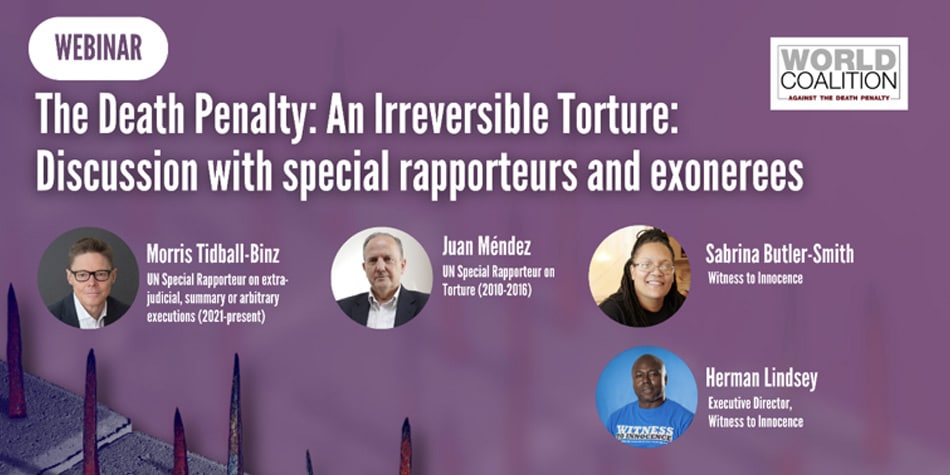
Article(s)
Highlights: Discussion on torture and the death penalty with UN experts and exonerees
By Venus Aves, on 6 November 2023
For the 21st World Day Against the Death Penalty dedicated to the reflection on the relationship between the use of the death penalty and torture or other cruel, inhuman, and degrading treatment or punishment started in 2022, the World Coalition hosted an online discussion with United Nations experts Morris Tidball Binz (UN Special Rapporteur on […]
2023
Cruel, Inhuman and Degrading Treatment and Punishment
Death Row Conditions
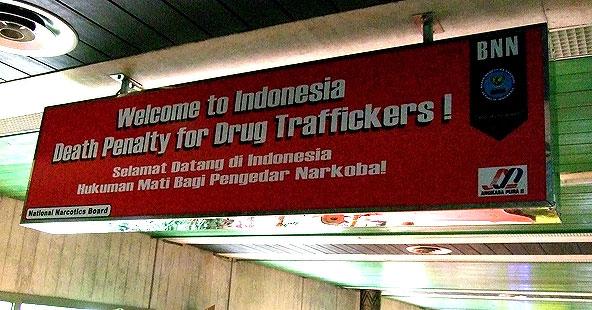
Article(s)
Indonesia: execution for drug crimes is no solution
By World Coalition Against the Death Penalty, on 26 January 2015
In an open letter, the World Coalition and its members, including KONTRAS and Amnesty International, condemn the Indonesian government’s politicizing of the death penalty to show its commitment to eradicating drug-related crimes. Recent resumptions of executions show one thing, they are carried out for political reasons only: in Pakistan to show that it is tough on terrorism, Jordan that it tough on crime and Indonesia that it is tough on drugs. Instead, those states should abolish the death penalty to show their commitment to upholding human rights. The next World Day against the Death Penalty will be dedicated to the issue of capital drug crimes.
2015
Drug Offenses
Indonesia
Document(s)
The Illusion of Heightened Standards in Capital Cases
By Anna VanCleave, University of Connecticut - School of Law, on 25 January 2024
2024
Article
Fair Trial
United States
More details See the document
Published on April 3, 2023.
The death penalty has gained its legitimacy from the belief that capital prosecutions are more procedurally rigorous than noncapi-tal prosecutions. This Article reveals how a project of heightened capital standards, set in motion when the Supreme Court ended and then revived the death penalty, was set up to fail.
In establishing what a constitutional death penalty would look like, the Court in 1976 called for heightened standards of reliability in capital cases. In the late 1970s and early 80s, the Supreme Court laid out specific constitutional procedures that must be applied in capital cases, and left the door open for the Eighth Amendment to do even more. In the decades that followed, state and federal courts have fueled a perception of heightened procedural rigor in capital cases by referring repeatedly to the heightened standards applica-ble in capital cases.
- Document type Article
- Countries list United States
- Themes list Fair Trial
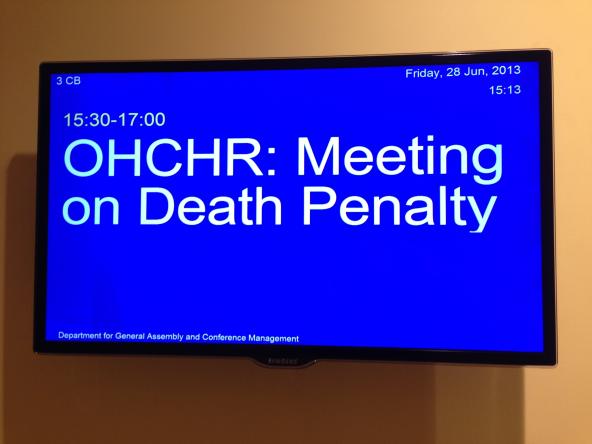
Article(s)
United Nations panel hears from innocent sentenced to death
By Maria Donatelli, on 4 July 2013
World Coalition members and a man who spent 18 years on death row for murders he did not commit joined UN Secretary General Ban Ki-Moon for a debate on capital punishment.
2013
Innocence
United States

Article(s)
Singapore must stop targeting HR defenders and media
By Aliran et al (Malaysiakini), on 20 February 2020
We, the 37 undersigned groups and organisations, and three individuals, are appalled by Singapore’s denial and response to the highlighting of alleged “barbaric” unlawful practices in execution method that was highlighted vide a Jan 16 media statement issued by Lawyers for Liberty (LFL).get to many more people when media reports on our statements.
2020
Singapore
Document(s)
Unfair trials report II: the death penalty is not the common value of Asia
By Taiwan Alliance to End the Death Penalty, on 1 January 2015
2015
Article
zh-hantMore details See the document
This report highlights the death penalty situation and executions in Asian countries between 2010 and 2013. It also gives an overview over the legal protection measures for the mentally impaired and intellectually disabled in Asian countries where the death penalty is used. Furthermore, we have listed Asian countries that have acceded to the ICCPR and its Second Optional Protocol. We have also collected excerpts from international human rights documents. By using these documents for mutual reference, death penalty activists in Asia will be able to get a more comprehensive picture of the use of the death penalty and executions in Asian countries.
- Document type Article
- Themes list International law, Public debate, Most Serious Crimes,
- Available languages 亞洲不公平審判報告 II : 死刑並非亞洲的共同價值
Document(s)
Issues Impacting LGBTQ+ Prisoners
By Death Penalty Information Center, on 3 September 2024
2024
NGO report
Cruel, Inhuman and Degrading Treatment and Punishment
Fair Trial
United States
More details See the document
LGBTQ+ people, especially people of color and low income, experience high levels of policing and criminalization, leading to an overrepresentation of these individuals in the incarcerated population. A 2017 study from researchers at the University of California, Los Angeles School of Law, suggests that LGBTQ+ people are three times as likely to be incarcerated than the general population. Once incarcerated, LGBTQ+ people are often subjected to violence from correctional staff and fellow prisoners, as well denied medical care and access to mental health services.
- Document type NGO report
- Countries list United States
- Themes list Cruel, Inhuman and Degrading Treatment and Punishment / Fair Trial
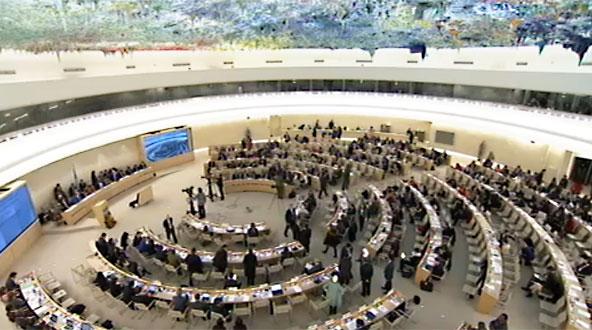
Article(s)
The United Nations Human Rights Council votes in favor of a new resolution on the death penalty
By Jessica Corredor, on 4 October 2017
After putting the death penalty at the heart of discussion, the 36th session of the United Nations Human Rights Council ended with the adoption of a resolution on the death penalty.
2017
Cruel, Inhuman and Degrading Treatment and Punishment
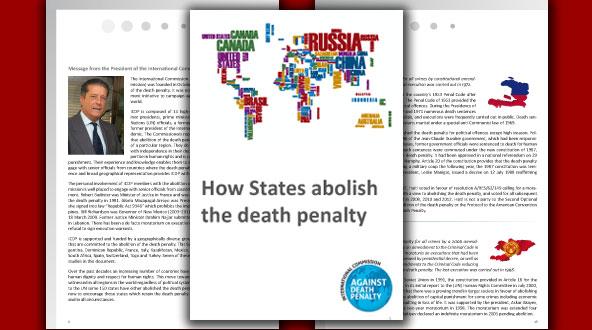
Article(s)
Study explores variety of national paths to abolition
By Thomas Hubert, on 3 May 2013
From courageous political leaders to traditional African values, the International Commission against the Death Penalty’s analysis of the factors leading to the abolition of capital punishment in 13 countries offers advice to retentionist countries.
2013
Cambodia
Haiti
Mongolia
Norway
Public Opinion
Rwanda
Senegal
South Africa
United States
Document(s)
Issues and recommendations to raise with the government of Malawi
By Reprieve, Sant'egidio, WCADP, on 27 May 2021
2021
NGO report
Malawi
More details Download [ pdf - 265 Ko ]
Overview
This document has been prepared by the Community of Sant’Egidio, Reprieve and the World Coalition Against the Death Penalty to assist the Commissioners ahead of the 2nd/3rd periodic report of the Government of Malawi that covers the reporting period of 2015-2019.
- Document type NGO report
- Countries list Malawi
Article(s)
Translations in Chinese
By World Coalition Against the Death Penalty, on 21 January 2013
The World Coalition Against the Death Penalty’s office in Paris, France, is currently calling for translation contributions in Chinese.
The objective is to award contracts for translation services for the publications of the World Coalition Against the Death Penalty for 30 months (mid 2013 – mid 2015).
2013
Document(s)
Race and Age Characteristics of those Sentenced to Death before and after Roper
By Frank R. Baumgartner, on 29 August 2022
2022
Academic report
frMore details Download [ pdf - 111 Ko ]
“The penalty of death is more likely to be imposed on individuals who suffer from various disadvantages: poverty, poor lawyers, mental illness, intellectual deficits, for example. It also is more common among those with white victims compared to minority victims, those who commit crimes in jurisdictions that have previously sentenced more individuals to death, and those who committed their crimes in the 1980s or 1990s as compared to more recent years (see Baumgartner et al. 2018 for details). In this short report I focus on two particular disadvantages: age and minority status.” – Frank R. Baumgartner
Link to the article: https://deathpenaltyinfo.org/news/report-racial-disparities-in-death-sentences-imposed-on-late-adolescent-offenders-have-grown-since-supreme-court-ruling-banning-juvenile-death-penalty
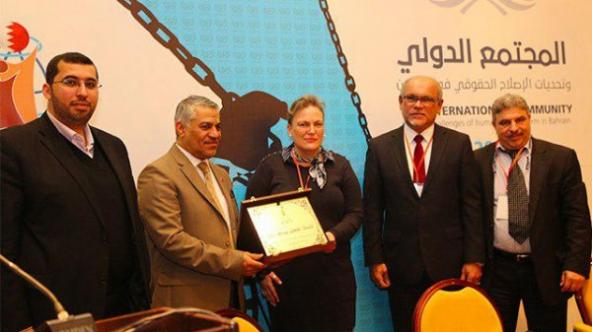
Article(s)
The 6th International Conference on Human Rights issues a warning on the alarming situation in Bahrain
By Emmanuel Trépied and Coalition marocaine contre la peine de mort, on 10 March 2017
The World Coalition was invited to take part in the 6th international Conference on Human Rights, on February 22nd, 2017 in Beirut. addressing the very worrying situation in Bahrain, the event resulted in a series of calls and recommendations.
2017
Bahrain
Cruel, Inhuman and Degrading Treatment and Punishment
Fair Trial
Moratorium
Terrorism
Document(s)
Justice Denied : A Global Study of Wrongful Death Row Convictions January 2018
By Sandra Babcock / Cornell Law School / Madalyn Wasilczuk and Sharon Pia Hickey / Delphine Lourtau / Katie Campbell / Julie Bloch, on 1 January 2018
2018
Academic report
frMore details See the document
On March 7, 2018, the Cornell Center on the Death Penalty Worldwide launched its new report entitled Justice Denied: A Global Study of Wrongful Death Row Convictions at the United Nations in Geneva, Switzerland. The report is a first-of-its-kind comparative study of the risk factors that increase the likelihood of wrongful convictions. The report illuminates the similarities in wrongful conviction risk factors in six countries across the geographical and political spectrum: Cameroon, Indonesia, Jordan, Malawi, Nigeria, and Pakistan.
- Document type Academic report
- Themes list Innocence, Death Row Conditions, Death Penalty,
- Available languages Déni de justice : Une étude mondiale sur les erreurs judiciaires dans les couloirs de la mort
Document(s)
International Perspectives on the Death Penalty: A Costly Isolation for the U.S.
By Death Penalty Information Center / Richard C. Dieter, on 1 January 1999
1999
NGO report
More details See the document
This report examines the sequence of recent events that has increasingly placed the death penalty in the international spotlight. Some of these events are direct challenges to the practice of capital punishment in the U.S. Others are changes in the balance of death penalty practices and attitudes around the world. The report looks at the ways in which the international community has sought to limit the application of the death penalty, and the U.S.’s response to these initiatives. It also explores the world-wide trend towards complete abolition of the death penalty and the U.S. reaction. Although much of the official U.S. response to international criticism has been denial, the report looks at some local and unofficial actions, which indicate a different direction. Finally, the report notes the present and potential costs the U.S. is facing for adhering to the death penalty.
- Document type NGO report
- Themes list Networks,
Document(s)
Broken Justice: The Death Penalty in Virginia
By Rachel King / American Civil Liberties Union / Virginia, on 1 January 2003
2003
NGO report
More details See the document
In April of 2000, the ACLU of Virginia published its first report on the status of the death penalty in Virginia. Since that time, a remarkable number of changes have taken place on this issue both in Virginia and throughout the country, which necessitated a second edition of the report. The first report examined four aspects of the administration of capital punishment in Virginia: prosecutorial discretion in the charging of capital crimes, quality of legal representation for the accused at trial, appellate review of trials resulting in the death penalty and the role of race. This report will look at those four areas and also add several other issues: the problem of prosecutorial misconduct in capital cases, the problem of executing mentally retarded offenders, the question of executing juvenile offenders and the danger of executing wrongfully convicted persons, as shown by the growing number of individuals who have been exonerated while on death row.
- Document type NGO report
- Themes list Country/Regional profiles,
Document(s)
The Modern Federal Death Penalty: A Cruel and Unusual Penalty
By Hannah Freedman, on 1 September 2022
2022
Academic report
Cruel, Inhuman and Degrading Treatment and Punishment
United States
More details See the document
The federal death penalty today would be unrecognizable to the founders, who saw the ultimate penalty as a means of protecting sovereign interests and who therefore carefully guarded the practice at English common law of yielding national interests to local ones. Over the course of time, the geographic distribution and substantive basis for the penalty changed, but until the modern era, its underlying purpose did not. As the Trump era executions made painfully clear, however, the federal death penalty today is different. It is disproportionately imposed for crimes that could have readily been prosecuted by other jurisdictions and that have little obvious connection to federal sovereignty, and it is disproportionately imposed against non-white people. By any rational measure, it is vanishingly rare, and it serves no valid penological goal. Simply put, federal death sentences today are, in most cases, “cruel and unusual in the same way that being struck by lightning is cruel and unusual.”
- Document type Academic report
- Countries list United States
- Themes list Cruel, Inhuman and Degrading Treatment and Punishment
Document(s)
Initiatives World Day 2006
By World Coalition against the death penalty , on 10 October 2006
2006
Campaigning
Trend Towards Abolition
frMore details See the document
Initiatives World Day 2006
- Document type Campaigning
- Themes list Trend Towards Abolition
- Available languages Initiatives journée mondiale 2006
Document(s)
Tanzania Human Rights Reports 2009: Incorporating Specific Part on Zanzibar
By Clarence Kipobota / Legal and Human Rights Centre, on 1 January 2010
2010
NGO report
More details See the document
The statistical information suggests that despite the executions that were done between 1961 and 1995, incidents of offences punishable by the death penalty were increasing and are still on the rise, from 46 convicts in 1961 to 2,562 in 2007. This report briefly describes the death penalty system in Tanzania.
- Document type NGO report
- Themes list Statistics,
Document(s)
The Death Penalty in the OSCE Area: Background Paper 2019
By Organization for Security and Co-operation in Europe (OSCE), on 1 January 2019
2019
International law - Regional body
More details See the document
Fifty-five (55) OSCE participating States have either completely abolished the death penalty or maintain moratoria on executions as an important first step towards abolition. However, in a global context where discussions focus on the threat of terrorism and a need to be tough on crime, it is perhaps not surprising that the question of reintroducing the death penalty surfaces at times, including in the OSCE region. It is, therefore, a good moment to reflect on the reasons why there is still support for the death penalty, considering the growing understanding that capital punishment is a cruel, inhuman and degrading punishment. Some of the most persistent arguments used to justify the use of the death penalty and its possible reintroduction will be discussed in the report.
- Document type International law - Regional body
- Themes list Trend Towards Abolition,
Document(s)
Little Furmans Everywhere: State Court Intervention and the Decline of the American Death Penalty
By Carol S. Steiker & Jordan M. Steiker, on 1 September 2022
2022
Academic report
Trend Towards Abolition
United States
More details See the document
This article retraces the evolution and recent decline of death peanlty in the United States, notablt through state court interventions. These dynamics between judicial and political action illuminate the importance of state court intervention in the story of the American death penalty’s precipitous decline, which has tended to foreground other institutional actors and to neglect the complex interactions among branches of government. State judicial rulings, though often highly technical and, therefore, less visible and accessible to the public, have been a pervasive and powerful force in the two-decade-long diminution of the practice of capital punishment across the United States.
- Document type Academic report
- Countries list United States
- Themes list Trend Towards Abolition
Document(s)
ISOLATION AND DESOLATION CONDITIONS OF DETENTION OF PEOPLE SENTENCED TO DEATH MALAYSIA – Bahasa Melayu
By Carole Berrih, Ngeow Chow Ying, ECPM, ADPAN, on 27 May 2021
2021
NGO report
Death Row Conditions
Malaysia
More details See the document
Isolation and Desolation – Conditions of Detention of People Sentenced to Death in Malaysia is the first ever fact-finding mission report on the conditions of detention of death row prisoners in Malaysia.
It examines the use of death penalty in Malaysia as well as the actual situation of people on death row.
This report is not meant to point fingers but rather to put the facts on the table in a transparent manner and work from there. It is mainly an advocacy tool for all abolitionist stakeholders, from civil society actors to the parliamentarians who will keep fighting for the abolition of the death penalty.
—————————————
Isolation and Desolation – Conditions of Detention of People Sentenced to Death di Malaysia adalah satu-satunya laporan berasaskan misi mengkaji fakta (fact-finding mission) mengenai keadaan-keadaan penahanan bagi banduan-banduan hukuman mati di Malaysia.
Laporan ini mengkaji pelaksanaan hukuman mati di Malaysia dan juga keadaan sebenar orang-orang yang dijatuhkan hukuman mati.
Laporan ini bukan bertujuan untuk menunding jari terhadap mana-mana pihak, tetapi bertujuan untuk memberi pencerahan kepada fakta-fakta yang ditemui dan berusaha ke atasnya. Laporan ini bertujuan utama sebagai alat advokasi kepada semua pihak yang mempunyai kepentingan dalam pemansuhan, bermula dari ahli persatuan kemasyarakatan sehingga ahli parlimen yang akan berusaha berterusan untuk memansuhkan hukuman mati.
- Document type NGO report
- Countries list Malaysia
- Themes list Death Row Conditions
Document(s)
AEDPA Repeal
By Brandon L. Garrett & Kaitlin Phillips, on 1 September 2022
2022
Academic report
Terrorism
United States
More details See the document
Given how pressing the problem has become, and the real interest in reforms to promote access to justice, this article takes a different tack than prior habeas reform work: to restore habeas corpus to its pre-AEDPA and pre-Rehnquist court state, in which a federal court can review claims and reach their merits. The approach would preserve flexibility at the district court level and remove the many layers of procedural complexity that the Supreme Court and then Congress have erected. We believe that deep changes are needed, and in that, we agree with judges and scholars that have for some time proposed such changes in the writ. As we describe, AEDPA was enacted as a culmination of more than two decades of complex Supreme Court law that had already limited access to federal habeas corpus. While AEDPA incorporated some of those procedural rulings, the concern would be that should AEDPA be repealed, even in part, those court-made restrictions could be interpreted to supplant AEDPA restrictions. Clear statutory language will be needed to ensure that the Court does not frustrate Congress, as it has in the past, by supplementing statutory text in order to limit constitutional remedies. We do not mean to suggest that the various proposals set out here are exhaustive. Our goal is to promote careful considerations of alternatives to the present-day set of federal habeas corpus statutes and accompanying judicial interpretation.
- Document type Academic report
- Countries list United States
- Themes list Terrorism
Document(s)
The death penalty worldwide developments in 2007
By Amnesty International, on 1 January 2008
2008
NGO report
fresarMore details See the document
In 2007 the world continued to move closer to the universal abolition of the capital punishment. A historical landmark is the resolution on a moratorium on executions endorsed by the United Nations. By the end of the 2007, 91 countries have abolished the death penalty for all crimes. The death penalty has now been abolished in law or practice by 135 countries. Other subjects covered in this report include commutations, judicial reviews, use against child offenders; and extradition.
- Document type NGO report
- Themes list Statistics,
- Available languages La peine de mort dans le monde : évolution en 2007LA PENA DE MUERTE EN EL MUNDO: NOTICIAS DEL AÑO 2007تطورات عقوبة العدام على النطاق العالمي في 2007
Document(s)
Legislators’ Opinions on the Death Penalty in Taiwan
on 24 March 2022
2022
NGO report
Public Opinion
Taiwan
zh-hantMore details See the document
In 2021, The Death Penalty Project and the Taiwan Alliance to End the Death Penalty (TAEDP) commissioned Professor Carolyn Hoyle at the University of Oxford and Professor Shiow-duan Hawang at Soochow University, Taipei to carry out a study exploring Taiwanese legislators’ attitudes towards capital punishment.
The study reveals that the majority of Taiwan’s legislators would like to see the death penalty abolished. The risk of wrongful convictions, the abuse of human rights and a recognition that the death penalty has no unique deterrent effect, were the primary reasons cited for supporting abolition. Additionally, a majority of legislators interviewed expressed fairly low levels of trust in the Taiwanese criminal justice system, with doubts raised over its ability to offer adequate safeguards to individuals facing capital trials.
Key findings:
– 61% of legislators interviewed are in favour of abolishing the death penalty
– 39% of legislators interviewed are in favour of retaining the death penalty, but only one legislator was strongly in favour
– 71% of retentionists and 65% of abolitionists asserted that wrongful convictions ‘sometimes’ occurred
– Only 11% of legislators interviewed thought that wrongful convictions ‘rarely’ occur
– All legislators interviewed expressed a preference for social justice measures, such as poverty reduction, over increased executions when asked to rank a range of policies aimed at reducing violent crime
- Document type NGO report
- Countries list Taiwan
- Themes list Public Opinion
- Available languages 台灣立法委員對死刑 之意見調查
Document(s)
The Last Holdouts: Ending the Juvenile Death Penalty in Iran, Saudi Arabia, Sudan, Pakistan, and Yeman
By Human Rights Watch, on 1 January 2008
2008
NGO report
arMore details See the document
In this 20-page report, Human Rights Watch documents failures in law and practice that since January 2005 have resulted in 32 executions of juvenile offenders in five countries: Iran (26), Saudi Arabia (2), Sudan (2), Pakistan (1), and Yemen (1). The report also highlights cases of individuals recently executed or facing execution in the five countries, where well over 100 juvenile offenders are currently on death row, awaiting the outcome of a judicial appeal, or in some murder cases, the outcome of negotiations for pardons in exchange for financial compensation
- Document type NGO report
- Themes list Juveniles,
- Available languages آخر المعاقلالقضاء على عقوبة إعدام الأحداث في إيران والمملكة العربيةالسعودية والسودان وباآستان واليمن
Document(s)
Caught in a Web Treatment of Pakistanis in the Saudi Criminal Justice System
By Human Rights Watch / Justice Project Pakistan, on 8 September 2020
2020
NGO report
Pakistan
More details See the document
Report about the treatment of Pakistanis in the Saudi criminal justice system
- Document type NGO report
- Countries list Pakistan
- Themes list Discrimination, Foreign Nationals,
Document(s)
State Secrets: China’s Legal Labyrinth
By Andrew Nathan / ChristineLoh / Liu Baopu / Fu Hualing / Jerome A. Cohen / Human Rights In China, on 8 September 2020
NGO report
China
More details See the document
This report describes and examines the PRC state secrets system and shows how itallows and even promotes human rights violations by undermining the rights tofreedom of expression and information. The PRC state secrets system, implementedthrough a CPC-controlled hierarchy of government bodies, is comprised of statesecrets laws and regulations that work in tandem with the PRC’s state security,criminal procedure and criminal laws, to create a complex, opaque system that controlsthe classification of—and criminalizes the disclosure or possession of—statesecrets. By guarding too much information and sweeping a vast universe of informationinto the state secrets net, the complex and opaque state secrets system perpetuatesa culture of secrecy that is not only harmful but deadly to Chinese society
- Document type NGO report
- Countries list China
- Themes list Transparency,
Document(s)
Written Statement to the 20th Session of the Working Group on the Universal Periodic Review on Iran
By Iran Human Rights (IHR) / United Nations / World Coalition Against the Death Penalty / The Advocates for Human Rights / Abdorrahman Boroumand Foundation for the Promotion of Human Rights and Democracy in Iran / Association for Human Rights in Kurdistan of Iran-Geneva (KMMK-G), on 1 January 2014
2014
NGO report
More details See the document
This report is being submitted by Abdorrahman Boroumand Foundation, The Advocates for Human Rights, Iran Human Rights (IHR), Association for Human Rights in Kurdistan of Iran-Geneva (KMMK-G), and the World Coalition Against the Death Penalty, relevant stakeholders, in conjunction with the Universal Periodic Review of Iran by the United Nations Human Rights Council. Iran will be subject to review during the 20th session (October – November 2014). This report examines the imposition of the death penalty in Iran in light of international human rights standards. This report will also examine and discuss the judicial process applied in cases involving punishment by the death penalty. Reports and commentary indicate that there is a serious problem of access to justice for the vast majority of individuals accused of crimes for which the death penalty is a possible punishment. It has been compiled from a combination of sources, including the penal code, news reports, non-governmental organizations (NGOs), and other commentary.
- Document type NGO report
- Themes list Juveniles, Minorities, Religion , Due Process , International law, Capital offences, Right to life, Drug Offences, Foreign Nationals, Stoning, Statistics,
Document(s)
Broken Justice: The death penalty in Alabama
By Rachel King / American Civil Liberties Union / Alabama, on 1 January 2005
2005
NGO report
More details See the document
This report documents unfairness and unreliability that plague the death penalty system in Alabama and makes several recommendations, including a moratorium on executions. The major areas of focus the report examines are: Inadequate Defence, Prosecutorial Misconduct, Judicial Overrides, Execution of the Mentallly Retarded, Racial Discrimination, and Geographic Disparities.
- Document type NGO report
- Themes list Country/Regional profiles,
Document(s)
The Death Penalty in Taiwan: Towards Abolition?
By International Federation for Human Rights (FIDH) / Sharon Hom / Penelope Martin / Siobhan Ni Chulachain, on 1 January 2006
2006
NGO report
More details See the document
This report highlights serious concerns regarding the conditions of detention of prisoners in Taiwan. Although there has been some improvement in conditions in recent years, FIDH and TAEDP report severe problems of overcrowding and inadequate medical treatment for prisoners, requiring urgent attention. In addition, the mission found that the use of shackles, in violation of international standards, is widespread. Prisoners, in particular those on death row, regularly have their legs chained together for 24 hours per day, in violation of the prohibition against cruel, inhuman and degrading treatment. Despite recent reforms to the criminal justice system, FIDH and TAEDP found that serious failings continue to lead to miscarriages of justice. The report highlights persistent problems including discrimination, limited access to legal representation, piecemeal and only partially implemented reforms and unsatisfactory appeals procedures. FIDH and TAEDP found that training and supervision for actors within the system, including police, is grossly inadequate, leading to failures in the collection and preservation of evidence, whilst prosecutors and judges are inclined to “rubber stamp” police findings.
- Document type NGO report
- Themes list Trend Towards Abolition, Death Row Conditions, Country/Regional profiles,
Document(s)
Human Rights Council, 39th session – Question of the death penalty
By United Nations, on 8 September 2020
2020
NGO report
More details See the document
Pursuant to Human Rights Council decision 18/117, the present report is submitted to update previous reports on the question of the death penalty. In his report the Secretary-General confirms that the trend towards the universal abolition of the death penalty is continuing. During the reporting period, initiatives limiting the use of the death penalty and implementing the safeguards guaranteeing protection of the rights of those facing the death penalty were also recorded in several States. A minority of States continued to use the death penalty, in contravention of international human rights law. As requested by the Council in its resolution 22/11, the report also includes information on the human rights of children of parents sentenced to the death penalty or executed.
- Document type NGO report
- Themes list Juveniles, Death Penalty,
Document(s)
Iran/death penalty: A state terror policy – Special edition for the 4th World Congress against the death penalty
By Bijan Baharan / International Federation for Human Rights (FIDH), on 8 September 2020
NGO report
Iran (Islamic Republic of)
faMore details See the document
This report covers the various aspects of the topic including: domestic laws, international legal framework, execution of juvenile offenders, religious and ethnic minorities, and methods of execution. According to the report, there are over 20 main categories of offences, some of them with several sub-categories, in the IRI, which are punishable by the death penalty. The majority of those “offences” are certainly not among “the most serious crimes.” Some others should not be considered as “offences” at all. In conclusion, FIDH issued a wide set of recommendations to the IRI and the international community. Among others, it recommended the adoption of an immediate moratorium on executions in light of the serious shortcomings of the guarantees of due process and fair trial.
- Document type NGO report
- Countries list Iran (Islamic Republic of)
- Themes list Minorities, Country/Regional profiles,
- Available languages ایران: مجازات اعدام سیاست دولتی ایجاد وحشت ـ ویژه نامه برای کنگره ی جهانی ضد مجازات اعدام
Document(s)
Written Statement to the 22nd Session of the Working Group on the Universal Periodic Review on Malawi
By World Coalition Against the Death Penalty / The Advocates for Human Rights, on 1 January 2014
2014
NGO report
More details See the document
This submission informs on Malawi’s international human rights obligations with regard to its use of the death penalty. This report will also examine and discuss the judicial process applied in cases involving punishment by the death penalty. Reports and commentary indicate that there is a serious problem of prison conditions and access to justice for the vast majority of individuals accused of crimes for which the death penalty is a possible punishment. This report has been compiled from a combination of sources, including the Malawi Penal Code, experts, news reports, non-governmental organizations, and other commentary. Further, this report makes recommendations that steps be taken to alleviate such conditions. These steps include both reducing the maximum possible sentence from death to one that is fair, proportionate and respects international human rights standards, complete abolition of capital punishment, universal access to adequate legal representation and provision of clean, safe, and appropriate prison conditions as well as regular monitoring.
- Document type NGO report
- Themes list Due Process , Death Row Conditions, Country/Regional profiles,
Document(s)
Terror on Death Row: The Abuse and Overuse of Pakistan’s Anti-Terrorism Legislation
By Reprieve / Justice Project Pakistan, on 8 September 2020
2020
NGO report
Pakistan
More details See the document
This report is a result of death row prisoner data from 38 prisons across Pakistan’s four provinces(Balochistan, Khyber Pakhtunkhwa (‘KPK ’),Punjab and Sindh. For most of Pakistan, the data runs to December 2012, thereby covering all those who are presently subject to execution dates. However, the report reflects further data on the province of Sindh running to October 2014
- Document type NGO report
- Countries list Pakistan
- Themes list Death Penalty, Country/Regional profiles,
Document(s)
Capital punishment and the implementation of the safeguards guaranteeing protection of the rights of those facing the death penalty
By United Nations, on 1 January 2017
2017
United Nations report
More details See the document
The present report is submitted pursuant to resolution 30/5 of the Human Rights Council. The report examines the consequences arising at various stages of the imposition and application of the death penalty on the enjoyment of the human rights of those facing the death penalty. It pays specific attention to the right to equality and non-discrimination in the context of the use of the death penalty. The report also highlights the discriminatory application of the death penalty to foreign nationals.
- Document type United Nations report
- Themes list International law, Right to life, Death Penalty,
Document(s)
TAJIKISTAN: DEADLY SECRETS – The death penalty in law and practice
By Amnesty International, on 8 September 2020
2020
NGO report
Tajikistan
ruMore details See the document
Official secrecy surrounds the death penalty in Tajikistan. The picture that Amnesty International has been able to build is incomplete, yet alarming. With random and relentless cruelty, prisoners are executed in secret after unfair trials, with no warning to their families. According to the evidence gathered by Amnesty International, none of the prisoners sentenced to death in Tajikistan received a fair trial. Most, if not all, were tortured. Several different prisoners have given detailed accounts naming the same investigator, but no action has apparently been taken to investigate the truth of these allegations. Testimony extracted under torture has been admitted as evidence and used to condemn prisoners to death.
- Document type NGO report
- Countries list Tajikistan
- Themes list Transparency, Country/Regional profiles,
- Available languages ТАДЖИКИСТАН: СМЕРТЕЛЬНЫЕ ТАЙНЫ
Document(s)
Efforts towards abolition of the death penalty: Challenges and prospects
By Death Penalty Research Unit (DPRU), University of Oxford, on 5 February 2024
2024
Academic Article
Trend Towards Abolition
More details See the document
Published in December 2023.
This paper reflects on the role of international human rights treaties in promoting universal abolition and progressive restriction of the death penalty. It suggests that over the past quarter of a century a ‘new human rights dynamic’ has aimed to generate universal acceptance that however it is administered, the death penalty violates the human rights of all citizens exposed to it. Nevertheless, defences of capital punishment based on principles of national sovereignty are engrained in some parts of the world, particularly in Asia and the Middle East. The human rights project struggles to make inroads into such jurisdictions where political will is opposed to abolition, and trenchant protection of sovereignty threatens the very universality of these rights.
- Document type Academic Article
- Themes list Trend Towards Abolition
Document(s)
Clemency Procedures in Death Penalty States
By Capital Punishment in Context, on 8 September 2020
2020
Working with...
More details See the document
This file is relevant to the US, giving a list of states where governors can grant clemency, where the governor must have recommendations of clemency and where governors recieve a non-binding recommendation of clemency.
- Document type Working with...
- Themes list Networks,
Document(s)
English-speaking Carribbean: time to make the death penalty history
By Amnesty International, on 1 January 2018
2018
NGO report
frMore details See the document
Ten years ago, on 19 December 2008, the authorities of Saint Kitts and Nevis carried out what was to become the last execution in the Americas, outside the USA. This anniversary, which follows on from the observance on 2 November of 25 years since a key judicial decision that puta brake on the implementation of death sentences in the region, offers an opportunity for reflection on the present state of the death penalty in the English-speaking Caribbean. Trends on the use of this punishment point to the inevitability of its abolition. On the occasion of this anniversary, Amnesty International renews its call on governments in the English-speaking Caribbean to take prompt steps towards consigning the death penalty to history once and for all.
- Document type NGO report
- Themes list Death Penalty, Country/Regional profiles,
- Available languages Caraïbes anglophones. Il est temps de reléguer la peine de mort dans les livres d'Histoire
Document(s)
Faith in Action
By Amnesty International - USA, on 1 January 2006
2006
Campaigning
More details See the document
Using faith to combat the death penalty: This document has sermons, prayers and services, essays, views on the death penalty, resources for discussion and action, resources for next steps.
- Document type Campaigning
- Themes list Networks,
Document(s)
USA: Darkness visible in the Sunshine State: The death penalty in Florida
By Amnesty International, on 1 January 2018
2018
NGO report
More details See the document
Florida promotes itself as a destination for tourists and a hub for trade. It is less well-known as a diehard proponent of a cruel policy discarded by much of the world. In 2016, the US Supreme Court ruled Florida’s capital sentencing scheme unconstitutional. Florida’s response has added another layer of arbitrariness to its death penalty. This report focusses on the state’s use of the death penalty against people who were young adults at the time of the crime and/or who have mental or intellectual disabilities. The Sunshine State should end its use of the ultimate cruel, inhuman and degrading punishment.
- Document type NGO report
- Themes list Public opinion, Discrimination, Country/Regional profiles,
Document(s)
Death Sentences and Executions in 2017
By Amnesty International, on 1 January 2018
NGO report
arfarufresMore details See the document
Amnesty International published its international global review of the death penalty on Tuesday, 12th April 2018.At least 993 executions in 23 countries in 2017 were recorded, down by 4% from 2016 (1,032 executions) and 39% from 2015 (when the organization reported 1,634 executions, the highest number since 1989). China remained the world’s top executioner, but excluding China, 84% of all reported executions took place in just four countries – Iran, Saudi Arabia, Iraq and Pakistan.
- Document type NGO report
- Themes list Trend Towards Abolition, Death Penalty, Statistics,
- Available languages أحكام الإعدام وما نفذ من أحكام في 2017: التقرير العالمي لمنظمة العفو الدوليةمار احکام مرگ و اعدام در سال 2017Смертные приговоры и казни 2017Condamnations à mort et exécutions en 2017Condenas a muerte y ejecutiones 2017
Document(s)
Death sentences and executions 2019
on 1 January 2020
2020
NGO report
aresfafrruMore details See the document
Document(s)
Deterrence and the Death Penalty Guide
By The Death Penalty Project, on 1 November 2022
2022
NGO report
Public Opinion
More details See the document
The most common justification for the retention of the death penalty among the minority of states that continue to sentence to death and execute individuals who are found guilty of committing certain serious offences is a belief that this punishment has a unique deterrent effect. The Death Penalty Project produced this resource on deterrence and the death penalty.
- Document type NGO report
- Themes list Public Opinion
Document(s)
Public Opinion and the Death Penalty Guide
By The Death Penalty Project, on 1 November 2022
NGO report
Public Opinion
More details See the document
When faced with calls to join the majority of states worldwide that have now abolished capital punishment, a key justification, typically relied upon by retentionist states, is that their citizens are not yet ready for abolition, and that political leaders must represent ‘the will of the people.’ The Death Penalty Project produced this resource on public opinion and the death penalty.
- Document type NGO report
- Themes list Public Opinion
Document(s)
Child Rights and the League of Arab States
By Childrens Rights Information Network, on 1 January 2011
2011
Working with...
More details See the document
This document provides a list of the members of the Arab League and the origins of the organisation. It also describes its composition and provides contact information.
- Document type Working with...
- Themes list Networks,
Document(s)
The Death Penalty: The Ultimate Punishment
By Amnesty International, on 1 January 2008
2008
Campaigning
enfresMore details See the document
Campaigning toolkit published by Amnesty International. A 16-page detailed advocacy document explaining why the abolition of the death penalty is necessary and how the theories behind capital punishment get it wrong.
- Document type Campaigning
- Themes list Networks,
- Available languages Korean : 사형제도 극단적 형벌La Peine de Mort: Le Châtiment SuprêmeLa Pena de Muerte: El Castigo Máximp
Document(s)
Zhao Zuohai: Beaten, Framed and Jailed for a Murder that Never Happened
By Clifford Coonan / The Independent, on 1 January 2010
2010
Legal Representation
More details See the document
The first act took place in 1999, when the dirt-poor farmer from Henan province had a violent argument with a fellow peasant, Zhao Zhenshang. His opponent, no relation despite a shared surname, disappeared into thin air. Later a headless, decomposed corpse was found in a well, and produced as evidence of Zhao Zuohai’s murderous deed. He was tortured, forced to confess and received the inevitable death sentence, before eventually winning a reprieve from the firing squad and having his sentence commuted to a 29-year jail term.
- Document type Legal Representation
- Themes list Networks,
Document(s)
The Death Penalty Worldwide – Developments in 2006 (With amendments)
By Amnesty International, on 8 September 2020
2020
NGO report
arfresMore details See the document
The world continued to move closer to the universal abolition of capital punishment during 2006. By the end of the year 88 countries had abolished the death penalty for all crimes. The death penalty has now been abolished in law or practice by 128 countries. Other subjects covered in this document include significant judicial decisions; the use of the death penalty against child offenders; resumptions of executions; and campaigning activities to promote abolition.
- Document type NGO report
- Themes list Statistics,
- Available languages التطورات المتعلقة بعقوبة العدام في شتى أنحاء العالم في العام ٢٠٠٦La peine de mort dans le monde : évolution en 2006LA PENA DE MUERTE EN EL MUNDO: NOTICIAS DEL AÑO 2006
Document(s)
THE MOST IMPORTANT FACTS OF 2003
By HANDS OFF CAIN, on 1 January 2004
2004
NGO report
enMore details See the document
The worldwide situation to date: The worldwide situation concerning the death penalty has once again registered a trend towards abolition in the past year. The countries or territories that to different extents have decided to give up the practice of capital punishment total 133, including the first months of 2004. Of these 81 have abolished the death penalty completely; 14 have abolished it for ordinary crimes; 1, Russia, as a member of the Council of Europe is committed to abolish it and in the meanwhile apply a moratorium on executions; 5 are observing moratoriums and 32 countries are de facto abolitionist, not having carried out executions for at least 10 years.
- Document type NGO report
- Themes list Statistics,
- Available languages Italian : I FATTI PIU´ IMPORTANTI DEL 2003 (e dei primi mesi del 2004)
Document(s)
Anything But Humane
By Amnesty International - USA, on 8 September 2020
2020
Arguments against the death penalty
More details See the document
A fact sheet on the lethal injection in the United States. This page details the process of lethal injection with statements of US health professional associations on participation in execution.
- Document type Arguments against the death penalty
- Themes list Lethal Injection,
Document(s)
Key legal Instruments and texts adopted on Abolition of the death penalty by the Council of Europe
By Council of Europe, on 24 January 2023
2023
Regional body report
Trend Towards Abolition
frMore details See the document
All the Council of Europe documents related to abolition of the death penalty gathered in one page : decisions of the Committee of Ministers, resolutions of the Parliamentary Assembly, Treaties…
- Document type Regional body report
- Themes list Trend Towards Abolition
- Available languages Instruments juridiques clés et textes adoptés sur l'abolition de la peine de mort par le Conseil de l'Europe
Document(s)
APYN Death Penalty Quizz
By Asia Pacific Youth Network, on 1 January 2009
2009
Campaigning
More details See the document
Quizz on the death penalty by the Asia Pacific Youth Network
- Document type Campaigning
- Themes list Networks,
Document(s)
Death sentences and executions in 2011
By Amnesty International, on 1 January 2012
2012
NGO report
enenfafrzh-hantesMore details See the document
Developments on the use of the death penalty in 2011 confirmed the global trend towards abolition. The number of countries that were known to have carried out death sentences decreased compared to the previous year, and overall, progress was recorded in all regions of the world. In this report, Amnesty International analyses some of the key developments in the worldwide application of the death penalty, citing figures it has gathered on the number of death sentences handed down and executions carried out during the year.
- Document type NGO report
- Themes list Statistics,
- Available languages Thai : สถานการณ์โทษประหาร และการประหารชีวิต ในปี 2554Korean : 연례사형현황 보고서 2011 사형선고와 사형집행اعدام و صدور حکم اعدام در سال2011Condamnations à mort et executions 2011國際特赦組織 全球死刑報告 2011Condenas a muerte y ejecuciones 2011
Document(s)
Death Sentences and executions in 2012
By Amnesty International, on 1 January 2013
2013
NGO report
enMore details See the document
The report covers the judicial use of death penalty for the period January to December 2012.It summarises Amnesty International’s global research on the death penalty. Information was gathered from various sources including official statistics (where available), non-governmental and inter-governmental organizations, human rights defenders, the media and interviews with survivors of human rights violations
- Document type NGO report
- Themes list Death Penalty, Statistics,
- Available languages أحكام الإعدام وما نُفذ منها في عام 2012
Document(s)
Pathways to abolition
By Death Penalty Worldwide / Cornell Law School, on 1 January 2016
2016
Academic report
More details See the document
This report documents the processes by which 14 jurisdictions abolished the death penalty in law. The conclusions attempt to identify patterns and draw conclusions in the hope that they will provide ideas, insights and inspiration to countries that either already are on their path to abolition or yet have to embark on it.
- Document type Academic report
- Themes list Trend Towards Abolition, Country/Regional profiles,
Document(s)
Pathways to Justice: Implementing a Fair and Effective Remedy following Abolition of the Mandatory Death Penalty in Kenya
By The Death Penalty Project, on 1 January 2019
2019
NGO report
More details See the document
This report draws on experiences in other jurisdictions where capital sentencing laws have been struck down or abolished, thereby generating the need for prisoners already unlawfully sentenced to death to be given substitute sentences. It delineates the ways in which other common law jurisdictions have addressed the practical and procedural challenges of resentencing following the abolition of the mandatory death penalty – navigating potential human rights infringements and ensuring that satisfactory requirements of due process are met. Resentencing procedures must also be scalable and practically accessible to the large number of individuals (thousands in the case of Kenya) entitled to relief.
- Document type NGO report
- Themes list Mandatory Death Penalty, Country/Regional profiles,
Document(s)
Death sentences and executions in 2010
By Amnesty International, on 1 January 2011
2011
NGO report
fresMore details See the document
In the last decade, more than 30 countries have abolished the death penalty in law or practice. Fifty-eight countries worldwide now retain the death penalty for ordinary crimes, and less than half of these carried out executions in 2010. This report analyzes some of the key developments in the worldwide application of the death penalty in 2010, citing figures gathered by Amnesty International on the number of death sentences handed down and executions carried out during the year.
- Document type NGO report
- Themes list Statistics,
- Available languages Condamnations à mort et exécutions et exécutions en 2010Condenas a meurte y ejecuciones en 2010
Document(s)
Death sentences and executions in 2009
By Amnesty International, on 1 January 2010
2010
NGO report
arfresMore details See the document
This document summarizes Amnesty International’s global research on the use of the death penalty in 2009. More than two-thirds of the countries of the world have abolished the death penalty in law or in practice. While 58 countries retained the death penalty in 2009, most did not use it. Eighteen countries were known to have carried out executions, killing a total of 714 people; however, this figure does not include the thousands of executions that were likely to have taken place in China, which again refused to divulge figures on its use of the death penalty. For an update to this document please see http://www.amnesty.org/en/library/info/ACT50/005/2010/en
- Document type NGO report
- Themes list Statistics,
- Available languages أحكام الإعدام وعمليات الإعدام في عام 2009CONDAMNATIONS À MORT ET EXÉCUTIONS RECENSÉES EN 2009CONDENAS A MUERTE Y EJECUCIONES 2009
Document(s)
So Long as They Die: Lethal Injections in the United States
By Human Rights Watch, on 1 January 2006
2006
NGO report
More details See the document
This 65-page report reveals the slipshod history of executions by lethal injection, using a protocol created three decades ago with no scientific research, nor modern adaptation, and still unchanged today. As the prisoner lies strapped to a gurney, a series of three drugs is injected into his vein by executioners hidden behind a wall. A massive dose of sodium thiopental, an anesthetic, is injected first, followed by pancuronium bromide, which paralyzes voluntary muscles, but leaves the prisoner fully conscious and able to experience pain. A third drug, potassium chloride, quickly causes cardiac arrest, but the drug is so painful that veterinarian guidelines prohibit its use unless a veterinarian first ensures that the pet to be put down is deeply unconscious. No such precaution is taken for prisoners being executed.
- Document type NGO report
- Themes list Lethal Injection,
Document(s)
Sentenced to oblivion. Fact-finding mission on death row. Cameroon
By Ensemble contre la peine de mort (ECPM) / Nestor Toko / Carole Berrih, on 8 September 2020
2020
NGO report
frMore details See the document
The report “Sentenced to oblivion. Fact-finding mission on death row. Cameroon”, which was officially launched on 21 June at the Delegation of the European Union from Yaoundé to Cameroon, is the result of an unprecedented fact-finding mission, conducted from May to October 2018 in five Cameroonian prisons by the Cameroonian Lawyers’ Network against the Death Penalty (Racopem) and the association ECPM (Ensemble contre la peine de mort).
- Document type NGO report
- Themes list Death Row Conditions, Country/Regional profiles,
- Available languages Condamnés à l'oubli. Mission d'enquête dans les couloirs de la mort. Cameroun
Document(s)
Juvenile Offenders Awaiting Execution in Yemen : “Look at Us with a Merciful Eye”
By Human Rights Watch, on 1 January 2013
2013
NGO report
arMore details See the document
The 30-page report found that at least 22 individuals have been sentenced to death in Yemen despite evidence that they were under age 18 at the time of their alleged crimes. In the last five years, Yemen has executed at least 15 young men and women who said they were under 18 at the time of their offense.
- Document type NGO report
- Themes list Juveniles, Country/Regional profiles,
- Available languages "انظروا إلينا بعين الرحمة" الأحداث على ذمة الإعدام في اليمن
Document(s)
MVFHR 飄洋過海來看你:看見被害人 20100704 台北信義誠品
By Taiwan Alliance to End the Death Penalty / Murder Victims' Families for Human Rights / YouTube, on 1 January 2011
2011
Working with...
enMore details See the document
這部短片是2010年美國被害人團體來台的報導(很抱歉,晚了一年才整理出來),今年,MVFHR將再度來台,並且也邀請日本的被害人團體一起在台灣巡迴演講「夜照亮了夜:身為被害人」(http://www.taedp.org.tw/index.php?load=read&id=964)
- Document type Working with...
- Themes list Murder Victims' Families,
- Available languages MVFHR Asia Speech Tour in Korea & Japan
Document(s)
Mass Injustice: Statistical Findings on the Death Penalty in Egypt
By Reprieve, on 1 January 2019
2019
NGO report
More details See the document
This report, Mass Injustice, presents the Egypt Death Penalty Index (“the Index”), a first-of-its-kind website and statisticaldatabase on Egypt’s application of thedeath penalty. The report provides background information on Egypt’s growing unlawful application of the death penalty, and explains how the Index was compiled.
- Document type NGO report
- Themes list Death Penalty, Country/Regional profiles,
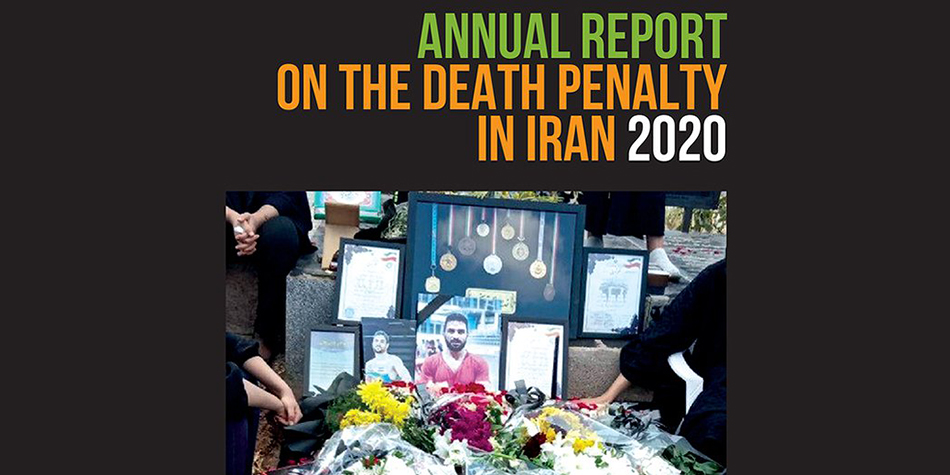
Article(s)
At least 267 People Executed in Iran in 2020 Despite COVID-19 Pandemic
By Iran Human Rights and Ensemble Contre La Peine de Mort (ECPM), on 5 May 2021
The 13th annual report on the death penalty by Iran Human Rights (IHR) and ECPM (Together Against the Death Penalty), shows that despite the COVID-19 pandemic, the Islamic Republic continued carrying out executions as in the previous years, and remains the only country to have executed juvenile offenders in 2020.
2021
Iran (Islamic Republic of)
Document(s)
Missouri’s Death Penalty in 2016: The Year in Review
By Missourians for Alternatives to the Death Penalty, on 1 January 2016
2016
NGO report
More details See the document
MADP’s 2016 report has compiled the death penalty data for the State of Missouri in 2016 and notices a significant decline of executions (6 in 2015, 1 in 2016). Moreover, no new death sentences were handed down in Missouri in 2016
- Document type NGO report
- Themes list Death Row Conditions, Discrimination, Death Penalty, Statistics, Country/Regional profiles,
Document(s)
Uzbekistan: ‘Justice only in heaven’ – the death penalty in Uzbekistan
By Amnesty International, on 8 September 2020
2020
NGO report
Uzbekistan
More details See the document
This document reports on the use of the death penalty in Uzbekistan. It looks at the scope of the death penalty and the current hurdles to its abolition. The report also examines those factors which commonly lead to judicial error – the use of arbitrary detention and torture, unfair trials and corruption.The latter part of the report looks at the conditions for prisoners on death row and the suffering inflicted by the state on the families of those sentenced to death.
- Document type NGO report
- Countries list Uzbekistan
- Themes list Country/Regional profiles,
Document(s)
The Death Penalty in Egypt
By International Federation for Human Rights (FIDH) / Etienne Jaudel / Alya Chérif Chammari / Nabeel Rajab, on 1 January 2005
2005
NGO report
arfrMore details See the document
The report notably points to the great number of crimes which entail the death penalty in Egypt and to the fact that civilians may be tried by military courts, sentenced to death and executed without delay, in violation of the rights of the defence and sometimes in abstentia. The only remedy is the unlikely pardon of the President of the Republic. Confessions obtained under duress are often accepted in court and form the basis of the sentence. The FIDH report recommends to the Egyptian authorities to put an immediate end to the state of emergency which, after 23 years, is no longer justified in Egypt today; the state of emergency is conducive to serious violations of human rights, including administrative detention without any effective judicial control, unfair trials of civilians before military courts, and widespread torture of detainees, including during the pre-trial stage. The Egyptian authorities should inquire into all allegations of torture and bring to justice those responsible.
- Document type NGO report
- Themes list Country/Regional profiles,
- Available languages عقوبة العدام في مصرLa peine de mort en Egypte
Document(s)
Reporting on the death penalty: training resource for journalists
By Penal Reform International, on 1 January 2011
2011
NGO report
More details See the document
The aim of this resource is to build and strengthen the knowledge and raise awareness of journalists on how to report on the death penalty and alternative sanctions. This training resource has been developed in conjunction with PRI’s partner, Inter Press Services (IPS).
- Document type NGO report
- Themes list Public opinion, Networks,
Document(s)
Counter terrorism in Kazakhstan: why the death penalty is no solution
By Penal Reform International, on 1 January 2013
2013
NGO report
enMore details See the document
This report focuses on the death penalty for terrorism related offences, an issue that has exercised many countries. It looks at evolving standards and practice internationally and considers how Kazakhstan can meet its human rights obligations while countering terrorism and maintaining the security of its people.
- Document type NGO report
- Themes list Terrorism,
- Available languages Терроризм в Казахстане Смертная казнь не решение проблемы
Document(s)
Affront to Justice: Death Penalty in Saudi Arabia
By Amnesty International, on 1 January 2008
2008
NGO report
arMore details See the document
Amnesty International has been documenting the Saudi Arabian authorities’ extensive use of the death penalty for over a quarter of a century. This report is the latest evaluation, made in light of the legal, judicial and human rights changes that have been introduced in recent years in the country. The report details cases of death row prisoners on whose behalf Amnesty International has campaigned. It also includes testimonies of former detainees, some of whom have been under sentence of death.
- Document type NGO report
- Themes list Beheading,
- Available languages صفعة في وجه العدالة:عقوبة الإعدام في المملكة العربية السعودية
Document(s)
The Death Penalty for Drug Offences: Global Overview 2017
By Harm Reduction International / Gen Sander, on 1 January 2018
2018
NGO report
More details See the document
The year 2017 marks 10 years since Harm Reduction International launched its Death Penalty for Drugs project. This report looks at the death penalty for drugs in law and practice and considers critical developments on the issue.
- Document type NGO report
- Themes list Drug Offences, Death Penalty,
Document(s)
UNITED STATES OF AMERICA: Indecent and internationally illegal: The death penalty against child offenders
By Amnesty International, on 1 January 2002
2002
NGO report
More details See the document
This report gives details of the national picture of the execution of juveniles, looking particularly at how two key decisions of the US Supreme Court have widened the gap between the USA and most other countries on this issue. The report examines the arguments used by those who oppose the execution of juvenile offenders and provides an overview of the international situation on the use of the death penalty against child offenders.
- Document type NGO report
- Themes list Juveniles,
Document(s)
Elimination of all forms of religious intolerance
By United Nations, on 1 January 2012
2012
International law - United Nations
arrufrzh-hantesMore details See the document
In the present report, the Special Rapporteur on freedom of religion or belief, Heiner Bielefeldt, provides an overview of his mandate activities since the submission of the previous report to the General Assembly (A/66/156), including his country visits, communications and other activities.
- Document type International law - United Nations
- Themes list Moratorium ,
- Available languages القضاء على جميع أشكال التعصّب الدينيЛиквидация всех форм религиозной нетерпимостиÉlimination de toutes les formes d’intolérance religieuse消除一切形式宗教不容忍Eliminación de todas las formas de intolerancia religiosa
Document(s)
Innocence and the Crisis in the American Death Penalty
By Death Penalty Information Center / Richard C. Dieter, on 1 January 2004
2004
NGO report
More details See the document
This report catalogs the emergence of innocence as the most important issue in the long-simmering death penalty debate. The sheer number of cases and the pervasive awareness of this trend in the public’s consciousness have changed the way capital punishment is perceived around the country. The steady evolution of this issue since the death penalty was reinstated in 1976 has been accelerated in recent years by the development of DNA technology, the new gold standard of forensic investigation. This science, along with a vigorous re-investigation of many cases, has led to the discovery of a growing number of tragic mistakes and freed inmates. The evidence in this report presents a compelling case for many Americans that the risks associated with capital punishment exceed acceptable bounds. One hundred and sixteen people have been freed from death row after being cleared of their charges, including 16 people in the past 20 months. These inmates cumulatively spent over 1,000 years awaiting their freedom. The pace of exonerations has sharply increased, raising doubts about the reliability of the whole system.
- Document type NGO report
- Themes list Innocence,
Document(s)
International Commission against the Death Penalty (ICDP) Review 2013
By International Commission Against the Death Penalty, on 1 January 2013
2013
NGO report
More details See the document
The International Commission against theDeath Penalty (ICDP) undertook anumber of activities in 2013 to reinforce andconsolidate the global trend toward abolition ofcapital punishment. This is a full report on ICDP’s workin 2013 as well as statistics on global trends on capital punishment.
- Document type NGO report
- Themes list Trend Towards Abolition, Statistics,
Document(s)
: Time to Abolish the Death Penalty in Zimbabwe: Exploring the Views of its Opinion Leaders
By Death Penalty Project, on 8 September 2020
2020
NGO report
Zimbabwe
More details See the document
This report draws on in-depth interviews with 42 opinion leaders on the death penalty, their knowledge of the criminal justice system, the likelihood of abolition and how that could be achieved. They represent the fields of politics, public service, law, religion, civil society, academia, and defence.
- Document type NGO report
- Countries list Zimbabwe
- Themes list Public opinion,
Document(s)
State-sponsored Homophobia: A world survey of laws prohibiting same sex activity between consenting adults
By Daniel Ottosson / International Lesbian, Gay, Bisexual, Trans and Intersex Association (ILGA), on 1 January 2010
2010
NGO report
enfresMore details See the document
The purpose of this annual report on State-sponsored Homophobia, as stated since its first edition in 2007, is to name and shame the states which in the 21st century deny the most fundamental human rights to LGBTI people, i.e. the right to life and freedom, in the hope that with every year more and more countries decide to abandon the ‘community’ of homophobic states.Compared to last year’s report, where we listed the 77 countries prosecuting people on ground of their sexual orientation, this year you will find ―only‖ 76 in the same list, including the infamous 5 which put people to death for their sexual orientation: Iran, Mauritania, Saudi Arabia, Sudan and Yemen (plus some parts of Nigeria and Somalia). One country less compared to the 2009 list may seem little progress, until one realizes that it hosts one sixth of the human population.
- Document type NGO report
- Themes list Homosexuality,
- Available languages Portuguese : Homofobia do Estado: Uma pesquisa mundial sobre legislações que proíbem relações sexuais consensuais entre adultos do mesmo sexoHomophobie d'État: Une enquête mondiale sur les lois qui interdisent la sexualité entre adultes consentants de même sexeHomofobia de Estado: Un informe mundial sobre las leyes que prohiben la actividad homosexual con consentimiento entre personas adultas
Document(s)
The Death Penalty in Japan: The Law of Silence – Going Against the International Trend
By Florence Bellivier / International Federation for Human Rights (FIDH) / Dan Van Raemdonck / Jiazhen Wu, on 8 September 2020
2020
NGO report
Japan
frMore details See the document
This report is the outcome of a fact-finding mission conducted by FIDH in July 2008, in order to assess the measures taken by the Japanese government to implement the recommendations made by a previous investigation, conducted in 2003.The conclusions of the report are appalling. According to Florence Bellivier, General Secretary of FIDH “Japan continues to condemn criminals to death, and incarcerate them up for decades, in prisons where secrecy and isolation are commonplace, in total disregard of the world opinion”. In addition, the rhythm of the executions has accelerated over the recent years. “2008 has been a record year, with more executions this year than in any other of the last fifteen years. We are witnessing a real step backwards” added Dan Van Raemdonck, Vice-President of FIDH. Thirteen persons have been executed since the beginning of the year, and 102 are currently on death row. There has not been a single retrial of a death penalty case since 1986, and no convicted prisoner has been pardoned since 1975.
- Document type NGO report
- Countries list Japan
- Themes list Transparency, Country/Regional profiles,
- Available languages La peine de mort au Japon: la loi du silence - À contre-courant de la tendance internationale
Document(s)
Mental Illness and the Death Penalty in North Carolina
By American Civil Liberties Union, on 1 January 2007
2007
NGO report
More details See the document
As this report lays bare, entrenched obstacles within the criminal justice system impede efforts to recognize those with severe mental illness and to treat them fairly. As detailed in this report, these obstacles include the fact that: 1, mentally ill offenders, because of their impairments, often undermine their own defenses in a variety of ways that contribute directly to their convictions, death sentences and executions; 2, although state law exclusively defines mental illness as a mitigating factor for sentencing purposes, juries often perceive mental illness as an aggravating (rather than mitigating) factor. 3, the law governing mental illness in the context of the death penalty does not often align itself with clinical realities; thus mental health experts must often answer legal questions that do not conform to their medical analyses.
- Document type NGO report
- Themes list Mental Illness,
Document(s)
America has abandoned the death penalty
By The Charles Hamilton Houston Institute for Race & Justice / Harvard Law School, on 1 January 2015
2015
Academic report
More details See the document
In 2015, America had the lowest number of executions in 25 years. Of the 28 people executed, 68% suffered from severe mental disabilities or experienced extreme childhood trauma and abuse according to a new report released by Harvard Law School’s Charles Hamilton Houston Institute for Race & Justice. A significant number of the executed individuals had multiple mental impairments. Two individuals were executed despite doubts about their guilt.
- Document type Academic report
- Themes list Country/Regional profiles,
Document(s)
SLAMMING THE COURTHOUSE DOORS – Denial of Access to Justice and Remedy in America
By American Civil Liberties Union / Washington, on 8 September 2020
2020
NGO report
United States
More details See the document
According to a new report by the American Civil Liberties Union (ACLU) entitled, “Slamming the Courthouse Doors: Denial of Access to Justice and Remedy in America,” many states severely restrict access to justice for capital defendants and limit the availability of remedies to correct errors. The problem of inadequate counsel continues to pervade death penalty systems across the country: “Few states provide adequate funds to compensate lawyers for their work or to investigate cases properly. In addition to inadequate funding, the majority of death-penalty states lack adequate competency standards. Many states require only minimal training and experience for attorneys handling death penalty cases, and in some cases capital defense attorneys fail to meet the minimum guidelines for capital defense set by the American Bar Association (ABA),” according to the ACLU. The report also states that the absence of a right to counsel in post-conviction appeals leaves capital defendants with few options to address serious errors during their trial.
- Document type NGO report
- Countries list United States
- Themes list Networks,
Document(s)
Complicity or Abolition?: The Death Penalty and International Support for Drug Enforcement
By Damon Barrett / Rick Lines / Patrick Gallahue / International Harm Reduction Association, on 1 January 2010
2010
NGO report
More details See the document
This report exposes the links between the carrying out of executions and the financial contributions from European governments, the European Commission and the UNODC to support drug enforcement operations in countries that use the death penalty such as China, Iran and Viet Nam. The report notes that such operations continue to be funded without appropriate safeguards despite the fact that the abolition of the death penalty is a requirement of entry into the Council of Europe and the European Union and that the United Nations advocates strongly against capital punishment
- Document type NGO report
- Themes list Drug Offences,
Document(s)
The Death penalty for Drug Offences: A Violation of International Human Rights Law
By Rick Lines / Harm Reduction International, on 1 January 2007
2007
NGO report
More details See the document
The report calls for an end to the use of the death penalty for drug offences around the world, and concludes that the on-going execution of drug offenders is a violation of international human rights law. The report emphasises how the harms faced by people who use drugs do not only include health harms such as HIV and hepatitis C infections, but also the effects of repressive law enforcement activities.
- Document type NGO report
- Themes list Drug Offences,
Document(s)
Judged for More than Her Crime: a Global Overview of Women Facing the Death Penalty
By Cornwell Death Penalty Project / Delphine Lourtau, on 1 January 2018
2018
NGO report
frMore details See the document
This groundbreaking report aims to bridge critical gaps in understanding of how states apply capital punishment from a gender perspective. This study is the first to examine how and when women receive death sentences and the conditions under which they are detained on death row, with a particular focus on India, Indonesia, Jordan, Malawi, Pakistan and the United States. The conclusions are that gender discrimination is pervasive at all stages of capital cases, but that its operation is complex. Report published by Cornell Center on the Death Penalty Worldwide with the support of the World Coalition Against the Death Penalty
- Document type NGO report
- Themes list Women,
- Available languages Jugée pour plus que son crime
Document(s)
Death penalty in Iran: A State terror policy – Special Update for 11th World Day against the Death Penalty
By International Federation for Human Rights (FIDH), on 8 September 2020
2020
NGO report
Iran (Islamic Republic of)
faMore details See the document
The change of administration in the Islamic Republic of Iran (IRI) and taking of office by a new president on 3 August 2013 has not brought any change as far as the death penalty is concerned. Between the 14 June presidential election and 1st October, more than 200 people have been reportedly executed, including possibly three people who may have been younger than 18 at the time of the commission of the alleged crimes.Against this backdrop, FIDH and its member organisation, LDDHI, have decided topublish the present report to analyse the new penal laws in force in Iran that are invoked consistently to violate the right to life in general and to execute child offenders. Coinciding with 10 October 2013, World Day against the Death Penalty, this report aimsto serve as an update on the current state of application of the death penalty in the IRI.
- Document type NGO report
- Countries list Iran (Islamic Republic of)
- Themes list Juveniles, Drug Offences, Hanging, Country/Regional profiles,
- Available languages مجازﺯاﺍتﺕ اﺍعداﺍمﻡ دﺩرﺭ اﺍﯾﻳراﺍنﻥ - سﯿﻴاست دﺩوﻭلتﯽﻲ اﺍﯾﻳجادﺩ وﻭحشت - وﻭﯾﻳژهﻩ ﯾﻳازﺯدﺩهمﯿﻴن رﺭوﻭزﺯ جهانﯽﻲ ضد مجازﺯاﺍتﺕ اﺍعداﺍمﻡ
Document(s)
Justice Crucified: The Death Penalty in Saudi Arabia
By Reprieve, on 1 January 2015
2015
NGO report
More details See the document
The Reprieve’s report analyses data on prisoners currently on death row in Saudi Arabia. It finds that 72 per cent of those prisoners whose alleged offences Reprieve has been able to determine were sentenced to death for non-violent crimes, including attendance at political protests and drug offences. Reprieve has also established that many prisoners estimated to have been executed in Saudi Arabia, since January 2014, had been sentenced to death for non-violent offences.
- Document type NGO report
- Themes list Drug Offences, Country/Regional profiles,
Document(s)
Flawed Justice: Unfair Trial and the Death Penalty in indonesia
By Amnesty International, on 1 January 2015
NGO report
enfrMore details See the document
Despite strong protests from local and international human rights organisations, the new Indonesian administration under President Joko Widodo has executed 14 people, including Indonesian and foreign nationals, in 2015. All of them had been convicted of drug trafficking. In other occasions President Widodo also stated publicly that the government would deny any application for clemency made by people sentenced to death for drug-related crimes. This report, which builds on Amnesty International’s past work over three decades documenting the use of death penalty in Indonesia, includes research carried out during a March 2015 visit to the country. The report highlights 12 individual cases of death row prisoners, out of a total of 131 people on death row, which point to systemic problems in Indonesia’s administration of justice that resulted in violations of international human rights law and standards.
- Document type NGO report
- Themes list Fair Trial, Drug Offences, Country/Regional profiles,
- Available languages Indonesian : Kaedilan ang Cacat. Peradilan Yang Tidak Adil Dan Hukuman Mati di IndonesiaUne justice déficiente. Procès iniques et recours à la peine de mort en Indonésie
Document(s)
Ghosts of Executions Past: A Case Study of Executions in South Carolina in the Pre-Furman Era
By John H. Blume, Samuel F. Leibowitz, on 1 September 2022
2022
Academic report
Cruel, Inhuman and Degrading Treatment and Punishment
United States
More details See the document
The protracted and (somewhat) ongoing debate over whether lethal injection—in some or all of its forms—is cruel and unusual punishment under the Eighth Amendment is the newest variation on the question of whether a particular form of capital punishment is inhumane and cruel. The history of capital punishment in the United States over the last two centuries has been punctuated by attempts to find less painful and gruesome ways to kill persons society has condemned to die. Ironically, at least from a historical perspective, some recent executions have seen condemned inmates or their attorneys elect some of the older methods, i.e., electrocution, or offer, as a potentially less painful alternative, the firing squad or death by lethal gas. And some states, including the main subject of this article, have resurrected electrocution and the firing squad because of a claimed inability or difficulty in obtaining execution drugs. In this article, the authors trace the history of execution methods in the pre-modern era of capital punishment (before 1972), primarily in South Carolina, pointing out the often-intractable problems with their implementation process (including specific “botches”), and then address other aspects of executions that have relevance to the current debate about the wisdom and efficacy of retaining the “modern” American death penalty in the twenty-first century.
- Document type Academic report
- Countries list United States
- Themes list Cruel, Inhuman and Degrading Treatment and Punishment
Document(s)
(Not) Talking about Capital Punishment in the Xi Jinping Era
By Tobias Smith, Matthew Robertson and Susan Trevaskes, on 1 September 2022
Academic report
China
More details See the document
An investigation into the death penalty in the People’s Republic of China in the Xi Jinping era (2012–) shows that unlike previous administrations, Xi does not appear to have articulated a signature death penalty policy. Where policy in China is unclear, assessing both the quality and frequency of discourse on the topic can provide evidence regarding an administration’s priorities.
This article was first published in Crime Justice Journal: https://www.crimejusticejournal.com/issue/view/119
- Document type Academic report
- Countries list China
Document(s)
Q&A: The Death Penalty and Drug Offenses
By World Coalition Against the Death Penalty, on 8 September 2020
2020
Academic report
frMore details Download [ pdf - 143 Ko ]
This Q&A was prepared by Harm Reduction International (www.ihra.net), the International Drug PolicyConsortium (www.idpc.net) and the World Coalition Against the Death Penalty (www.worldcoalition.org) aheadof World Day against the Death Penalty on 10 October 2015.
- Document type Academic report
- Themes list Drug Offences,
- Available languages Questions-Réponses: peine de mort et trafic de drogue

Article(s)
Justice Denied: A Global Study of Wrongful Death Row Convictions
By Death Penalty Worldwide, on 26 March 2018
The report is a first-of-its-kind comparative study of wrongful convictions. The report illuminates the similarities in wrongful conviction in six countries: Cameroon, Indonesia, Jordan, Malawi, Nigeria, and Pakistan.
2018
Cameroon
Indonesia
Innocence
Jordan
Malawi
Nigeria
Pakistan
Document(s)
Abolitionnist portrait
By World Coalition against the death penalty , on 10 October 2004
2004
Campaigning
Trend Towards Abolition
frMore details See the document
Abolitionnist portrait
- Document type Campaigning
- Themes list Trend Towards Abolition
- Available languages Portrait d'abolitionnistes
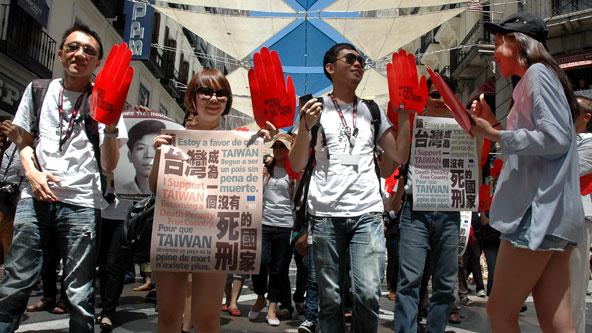
Article(s)
Asian progress paves the way for new strategies
By Thomas Hubert, on 20 June 2013
Although most executions continue to take place in Asia, their number is going down – and abolitionists are coming up with new ideas to bring about abolition.
2013
India
Japan
Malaysia
Mongolia
Moratorium
Singapore
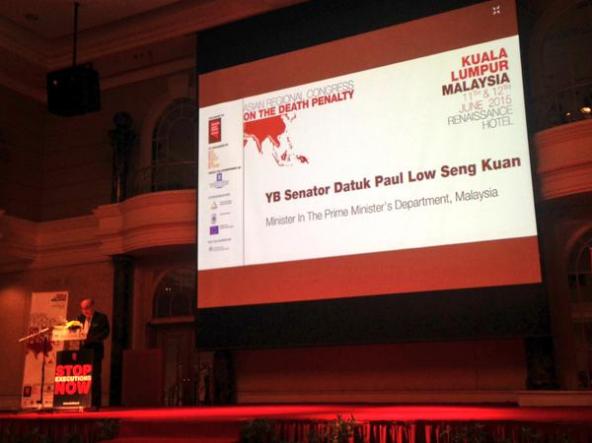
Article(s)
Regional Congress against the Death Penalty Live!
By World Coalition Against the Death Penalty, on 12 June 2015
Follow the Asia Regional Congress against the Death Penalty organised by ECPM in partnership with ADPAN on 11-12 June 2015 in Kuala Lumpur, Malaysia
2015
Malaysia
Article(s)
Asia-Pacific youths oppose the death penalty in pictures
on 10 October 2008
Amnesty International’s Asia Pacific Youth Network has been collecting photos of young people protesting against capital punishment in the lead up to World Day Against the Death Penalty.
2008
Document(s)
Compendium of case law of the European Court of Human Rights on the death penalty and extrajudicial execution
By Jeremy McBride, Council of Europe, on 24 April 2022
2022
International law - Regional body
Legal Representation
More details See the document
The compendium’s aim is to assist national judges, prosecutors and lawyers from the 46 member states of the Council of Europe to deal with extradition or deportation cases when there is a risk of the death penalty being imposed in third countries or of extrajudicial execution. It also aims at enabling legal professionals from countries where the death penalty still exists to develop arguments based upon the reasoning of the case law of the European Court of Human Rights. It contains relevant extracts from the Court’s case law, structured in a user-friendly way.
- Document type International law - Regional body
- Themes list Legal Representation

Article(s)
Philippines’ Major Setback as Abolitionist Leader in South-East Asia
By Dinda Royhan, on 23 January 2020
As a prominent leader in the campaign against death penalty in the South East Asia region for the last decade, Philippines’ reputation is endangered with President Duterte’s determination to reintroduce death penalty in the country. The country’s legislators are now on its second attempt to pass the bills.
2020
Philippines
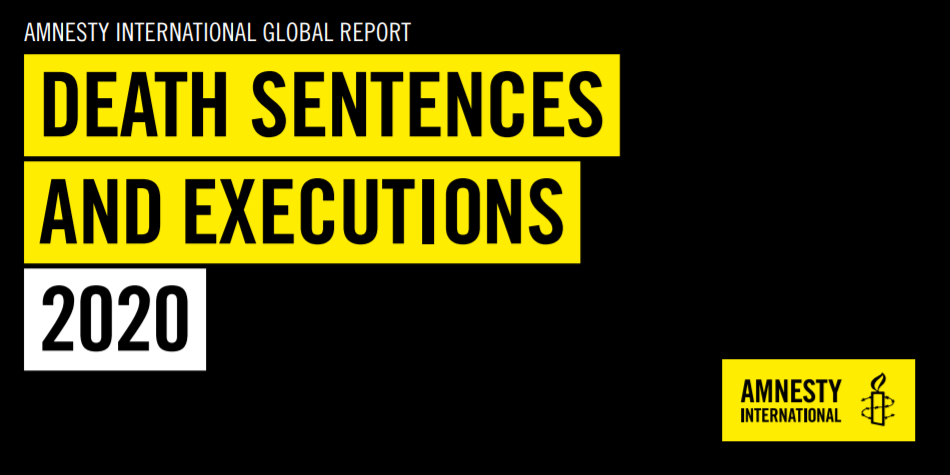
Article(s)
Editorial: Amnesty International releases annual report
By Amnesty International, on 27 May 2021
On 21 April, we published our annual report on the global use of the death penalty, which shows that in 2020 the world got one step closer to freeing itself from this cruel punishment.
2021
Cruel, Inhuman and Degrading Treatment and Punishment
Death Row Conditions
Public Opinion

